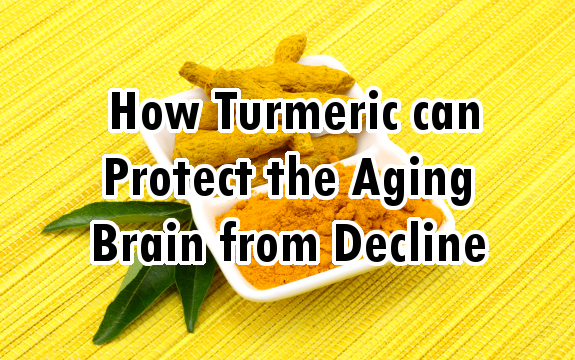Study Sheds Light on How Turmeric can Protect the Aging Brain from Decline

 The many benefits of
The many benefits of
According to the study, published in the journal Cellular Physiology and Biochemistry, this brain-protection effect is a result of something called uncoupling protein 2 (UCP2) and its role in reducing oxidative stress in the brain.
As GreenMedInfo reports, curcumin, the compound in
The study used 24-month old male rats, giving them daily curcumin at a rate of .2%, comparing them with a control group of 6-month old male rats. After one month of the treatment, the older rats experienced a “remarkable restoration” in brain function, or the “impaired cerebrocascular endothelium-dependent vasorelaxation,” the ability of vessels in the brain to relax and allow blood to flow freely.
In addition, the researchers noted, the curcumin promoted phosphylation of AMPK and eNOS, both related to improved endothelial function and cardiovascular risk factors. The curcumin was also able to reduce production of Reactive Oxygen Species (ROS) , which is associated with decreased oxidative stress and cell damage.
“In summary, our findings provide the first evidence that chronic pharmacological AMPK/UCP2 pathway activation by curcumin treatment may be an effective therapeutic strategy to reverse age-related cerebrovascular dysfunction,” the researchers wrote. “Curcumin administration may represent a promising lifestyle intervention for preventing age-related cerebrovascular disturbances.”
But this is far from the first study to link
In one case study, “Effects of
In addition to a dramatic improvement in their moods, agitation, anxiety, and dementia, there were no negative side effects of the treatment.
While science attempts to sort out how

Please clarify – was that 764 mg of turmeric, or 764 mg of curcumin, and, in either case, was it combined with something to increase its absorption/bioavailability, or straight out of the spice jar?
I really would like to know because there are so many commercial products out there with competing claims and i would prefer to just use the plain turmeric spice mixed with whatever will increase its absorption/bioavailability …
Thanx!
Last sentence in “case study” article – “This is the first case report demonstrating that turmeric is an
effective and safe drug for the treatment of the BPSD in AD patients and
that it might impair cognitive function.” – Misprint?
Turmeric is fantastic. I am 47 and was having really serious brain fogs…forgetting what I was doing moment to moment etc, (whereas I used to carry shopping lists in my head). Fresh turmeric root, fried in coldpressed rape oil, with black pepper – works wonders for me. Also DMSO (sulphur) a couple of drops in water twice a day – supposed to be good. Alzheimers starts in the 40’s and 50’s, so it’s worth getting to grips with it early on. Also consider good quality Miso (non Fukushima’d) and raw milk kefir to aid your digestion. Getting rid of the bad stuff at the first stage, digestion, is critical to long-term health, and Miso and Kefir are two highly effective foods/digestive fortifiers. Miso also has I believe Nattokinase, which removes Amyloid plaques. Coconut oil is also promoted as an anti-Alzheimers food. But Turmeric has the most dramatic effect of all foods, imo. It literally feels like a brain purification when I eat it.
Forgot (haha!) to mention liposomal Glutathione. Must try this soon. And I also need to source fluoride-free water…………
Re DMSO – please do your own Due diligence before you use it. E.G. it increase absorption of drugs into the body, etc. http://www.health-matrix.net/2011/03/15/dmso-the-real-miracle-solution/